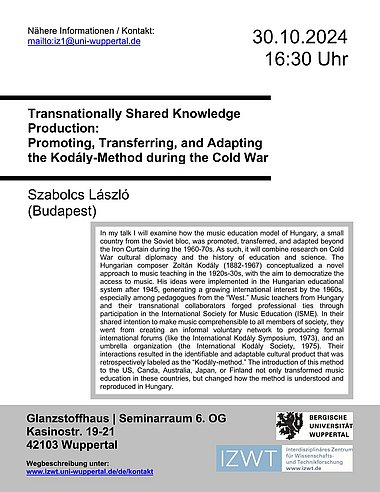IZWT-Kolloquium - Transnationally Shared Knowledge Production: Promoting, Transferring, and Adapting the Kodály-Method during the Cold War

In my talk I will examine how the music education model of Hungary, a small country from the Soviet bloc, was promoted, transferred, and adapted beyond the Iron Curtain during the 1960-70s. As such, it will combine research on Cold War cultural diplomacy and the history of education and science. The Hungarian composer Zoltán Kodály (1882-1967) conceptualized a novel approach to music teaching in the 1920s-30s, with the aim to democratize the access to music. His ideas were implemented in the Hungarian educational system after 1945, generating a growing international interest by the 1960s, especially among pedagogues from the “West.” Music teachers from Hungary and their transnational collaborators forged professional ties through participation in the International Society for Music Education (ISME). In their shared intention to make music comprehensible to all members of society, they went from creating an informal voluntary network to producing formal international forums (like the International Kodály Symposium, 1973), and an umbrella organization (the International Kodály Society, 1975). Their interactions resulted in the identifiable and adaptable cultural product that was retrospectively labeled as the “Kodály-method.” The introduction of this method to the US, Canda, Australia, Japan, or Finland not only transformed music education in these countries, but changed how the method is understood and reproduced in Hungary.
Termin ICS-Download